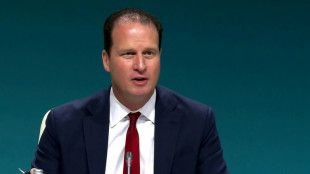
-
 Trump's Republican allies tread lightly on Paris pact at COP29
Trump's Republican allies tread lightly on Paris pact at COP29
-
Graham equals record as nine-try Scotland see off tenacious Portugal

-
 Protesters hold pro-Palestinian march in Rio ahead of G20
Protesters hold pro-Palestinian march in Rio ahead of G20
-
Graham equals record as nine-try Scotland see off dogged Portugal

-
 China's Xi urges APEC unity in face of 'protectionism'
China's Xi urges APEC unity in face of 'protectionism'
-
Japan's Kagiyama, Yoshida sweep gold in Finland GP

-
 Macron to press Milei on climate action, multilateralism in Argentina talks
Macron to press Milei on climate action, multilateralism in Argentina talks
-
Fritz reaches ATP Finals title decider with Sampras mark in sight

-
 All eyes on G20 for breakthrough as COP29 climate talks stall
All eyes on G20 for breakthrough as COP29 climate talks stall
-
Fritz battles past Zverev to reach ATP Finals title decider

-
 Xi, Biden to meet as Trump return looms
Xi, Biden to meet as Trump return looms
-
Kane warns England must protect team culture under new boss

-
 Italy beat Japan to reach BJK Cup semi-finals
Italy beat Japan to reach BJK Cup semi-finals
-
Farmers target PM Starmer in protest against new UK tax rules

-
 Shiffrin masters Levi slalom for 98th World Cup win
Shiffrin masters Levi slalom for 98th World Cup win
-
Italy's Donnarumma thankful for Mbappe absence in France showdown

-
 McIlroy in three-way tie for Dubai lead
McIlroy in three-way tie for Dubai lead
-
Bagnaia wins Barcelona MotoGP sprint to take season to final race

-
 Ukraine's Zelensky says wants to end war by diplomacy next year
Ukraine's Zelensky says wants to end war by diplomacy next year
-
Shiffrin wins Levi slalom for 98th World Cup victory

-
 Israel pummels south Beirut as Lebanon mulls truce plan
Israel pummels south Beirut as Lebanon mulls truce plan
-
Religious Jews comfort hostages' families in Tel Aviv

-
 German Greens' Robert Habeck to lead bruised party into elections
German Greens' Robert Habeck to lead bruised party into elections
-
Johnson bags five as Australia beat Pakistan to seal T20 series

-
 Zelensky says wants to end war by diplomacy next year
Zelensky says wants to end war by diplomacy next year
-
Rugby Union: Wales v Australia - three talking points

-
 10 newborns killed in India hospital fire
10 newborns killed in India hospital fire
-
Veteran Le Cam leads Vendee Globe as Sorel is first to quit

-
 Bagnaia on pole for Barcelona MotoGP, Martin fourth
Bagnaia on pole for Barcelona MotoGP, Martin fourth
-
UN climate chief urges G20 to spur tense COP29 negotiations

-
 Rauf takes four as Pakistan hold Australia to 147-9 in 2nd T20
Rauf takes four as Pakistan hold Australia to 147-9 in 2nd T20
-
World not listening to us, laments Kenyan climate scientist at COP29

-
 Philippines warns of 'potentially catastrophic' Super Typhoon Man-yi
Philippines warns of 'potentially catastrophic' Super Typhoon Man-yi
-
Wales take on Australia desperate for victory to avoid unwanted record

-
 Tyson beaten by Youtuber Paul in heavyweight return
Tyson beaten by Youtuber Paul in heavyweight return
-
Taylor holds off bloodied Serrano to retain undisputed crown

-
 Japan PM expresses concern to Xi over South China Sea situation
Japan PM expresses concern to Xi over South China Sea situation
-
Tens of thousands flee as Super Typhoon Man-yi nears Philippines

-
 Hoilett gives Canada win in Suriname as Mexico lose to Honduras
Hoilett gives Canada win in Suriname as Mexico lose to Honduras
-
Davis, James spark Lakers over Spurs while Cavs stay perfect

-
 Mushroom houses for Gaza? Arab designers offer home-grown innovations
Mushroom houses for Gaza? Arab designers offer home-grown innovations
-
Gabon votes on new constitution hailed by junta as 'turning point'

-
 Young Libyans gear up for their first ever election
Young Libyans gear up for their first ever election
-
Vice tightens around remaining civilians in eastern Ukraine

-
 Dutch coalition survives political turmoil after minister's resignation
Dutch coalition survives political turmoil after minister's resignation
-
Uruguay end winless run with dramatic late win over Colombia

-
 Max potential: 10 years since a teenage Verstappen wowed in Macau
Max potential: 10 years since a teenage Verstappen wowed in Macau
-
Tens of thousands flee as Typhoon Man-yi nears Philippines

-
 Is Argentina's Milei on brink of leaving Paris climate accord?
Is Argentina's Milei on brink of leaving Paris climate accord?
-
Big Bang: Trump and Musk could redefine US space strategy


'Big sponge': new CO2 tech taps oceans to tackle global warming
Floating in the port of Los Angeles, a strange-looking barge covered with pipes and tanks contains a concept that scientists hope to make waves: a new way to use the ocean as a vast carbon dioxide sponge to tackle global warming.
Scientists from University of California Los Angeles (UCLA) have been working for two years on SeaChange -- an ambitious project that could one day boost the amount of CO2, a major greenhouse gas, that can be absorbed by our seas.
Their goal is "to use the ocean as a big sponge," according to Gaurav Sant, director of the university's Institute for Carbon Management (ICM).
The oceans, covering most of the Earth, are already the planet's main carbon sinks, acting as a critical buffer in the climate crisis.
They absorb a quarter of all CO2 emissions, as well as 90 percent of the warming that has occurred in recent decades due to increasing greenhouse gases.
But they are feeling the strain. The ocean is acidifying, and rising temperatures are reducing its absorption capacity.
The UCLA team wants to increase that capacity by using an electrochemical process to remove vast quantities of CO2 already in seawater -- rather like wringing out a sponge to help recover its absorptive power.
"If you can take out the carbon dioxide that is in the oceans, you're essentially renewing their capacity to take additional carbon dioxide from the atmosphere," Sant told AFP.
- Trapped -
Engineers built a floating mini-factory on a 100-foot (30-meter) long boat which pumps in seawater and subjects it to an electrical charge.
Chemical reactions triggered by electrolysis convert CO2 dissolved in the seawater into a fine white powder containing calcium carbonate -- the compound found in chalk, limestone and oyster or mussel shells.
This powder can be discarded back into the ocean, where it remains in solid form, thereby storing CO2 "very durably... over tens of thousands of years," explained Sant.
Meanwhile, the pumped water returns to the sea, ready to absorb more carbon dioxide from the atmosphere.
Sant and his team are confident the process will not damage the marine environment, although this will require further testing to confirm.
A potential additional benefit of the technology is that it creates hydrogen as a byproduct. As the so-called "green revolution" progresses, the gas could be widely used to power clean cars, trucks and planes in the future.
Of course, the priority in curbing global warming is for humans to drastically reduce current CO2 emissions -- something we are struggling to achieve.
But in parallel, most scientists say carbon dioxide capture and storage techniques can play an important role in keeping the planet livable.
Carbon dioxide removal (CDR) could help to achieve carbon neutrality by 2050 as it offsets emissions from industries which are particularly difficult to decarbonize, such as aviation, and cement and steel production.
It could help to tackle the stocks of CO2 that have been accumulating in the atmosphere for decades.
- 'Promising solution' -
Keeping global warming under control will require the removal of between 450 billion and 1.1 trillion tons of CO2 from the atmosphere by 2100, according to the first global report dedicated to the topic, released in January.
That would require the CDR sector "to grow at a rate of about 30 percent per year over the next 30 years, much like what happened with wind and solar," said one of its authors, Gregory Nemet.
UCLA's SeaChange technology "fits into a category of a promising solution that could be large enough to be climate-relevant," said Nemet, a professor at the University of Wisconsin-Madison.
By sequestering CO2 in mineral form within the ocean, it differs markedly from existing "direct air capture" (DAC) methods, which involve pumping and storing gas underground through a highly complex and expensive process.
A start-up company, Equatic, plans to scale up the UCLA technology and prove its commercial viability, by selling carbon credits to manufacturers wanting to offset their emissions.
In addition to the Los Angeles barge, a similar boat is currently being tested in Singapore.
Sant hopes data from both sites will quickly lead to the construction of far larger plants that are capable of removing "thousands of tons of carbon" each year.
"We expect to start operating these new plants in 18 to 24 months," he said.
D.Schneider--BTB
